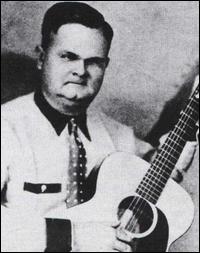Post by Admin on May 22, 2013 9:14:42 GMT -5

Riley Puckett was one of the pioneers of country music, a singer whose output both as a solo performer and as a member of the supergroup the Skillet Lickers left an indelible mark on the work produced in his wake. He was born George Riley Puckett on May 7, 1894, in Alpharetta, GA; though at birth he had the ability to see, a medical mishap during his infancy left him blind. He attended the Macon School for the Blind, where he learned to read Braille and began playing the banjo, followed by the guitar, developing a unique, arhythmic style of playing bass-note runs to bridge chord changes. He also attracted attention at regional fiddling contests.
Puckett made his radio debut with Clayton McMichen's Hometown Band on WSB Atlanta in 1922. He soon became one of the station's most popular performers, and began appearing as a soloist. The next year, he joined with mandolinist Ted Hawkins and fiddler Lowe Stokes to form the Hometown Boys, where his smooth vocal style and yodeling abilities earned the group a devoted following among WSB listeners, who began calling the singer "the Ball Mountain Caruso." In 1924, Puckett accompanied James "Gideon" Tanner to Columbia Records' New York City studios, where he cut his first sides, including a cover of Fiddlin' John Carson's "The Little Old Log Cabin," "Steamboat Bill," and "Rock All Our Babies to Sleep," believed to contain the first-ever appearance of yodeling on a country record. The results proved highly successful, and later in the year a second session followed; accompanying himself on banjo, Puckett recorded, among others, "Oh Susannah" and "You'll Never Miss Your Mother Till She's Gone."
In 1925, Columbia introduced their 15000-D Hillbilly Series, and Puckett quickly became one of the imprint's most successful acts; only Vernon Dalhart sold more records. A year later, he joined the Skillet Lickers, which also featured Gid Tanner and Clayton McMichen, and remained with the group through 1931. In 1927, he also joined high tenor Hugh Cross for the very first recording of "Red River Valley." The duo went on to cut two more sessions together, generating songs like "Gonna Raise a Ruckus Tonight" (released under the name Alabama Barnstormers), "Call Me Back Pal o' Mine," and "My Wild Irish Rose."
While the onset of the Depression did not crush Puckett's career, as it did to so many of his contemporaries, it did force him to curtail his prolific recording schedule. The records he did cut appeared under a variety of group names and aliases, the most successful being 1931's "My Carolina Home," issued as McMichen's Melody Men. After the demise of the Skillet Lickers, Puckett performed with McMichen's Georgia Wildcats; in 1932, the Skillet Lickers began anew, and Puckett also signed on with Bert Layne's Mountaineers. In addition, he recorded a number of duets with Red Jones, including "I Only Want a Buddy, Not a Sweetheart" and "St. Louis Blues."
By 1936, he was touring with former Mainer Mountaineer "Daddy" John Love and also performed again with Bert Layne. After organizing his own tent show to tour throughout the South, he returned to New York to record with Red Jones, duetting on "Alttoona Train Wreck," "Take Me Back to My Carolina Home," and "The Broken Engagement." Puckett did not record again until 1940, when he cut the pop-oriented "Oh, Johnny, Oh," "Little Sir Echo," and "South of the Border." In 1941, he entered the studio one last time, performing "How Come You Do Me Like You Do," "Railroad Blues," and "Peach Picking Time in Georgia." Puckett continued performing on radio with the Stone Mountain Boys until 1946, when on July 14 he died from blood poisoning as a result of a boil on his neck which was left untreated.

